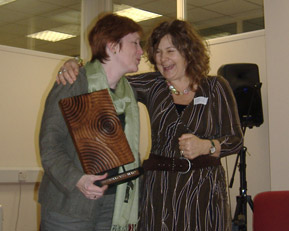2008 winner
The Linda McEnhill Award was launched in 2008, to recognise and celebrate the achievements of Linda McEnhill. Linda founded the PCPLD Network (then called the National Network for Palliative Care of People with Learning Disabilities, or NNPCPLD) in 1998, and was its chair for 10 years.

Linda McEnhill receives the award from Noëlle Blackman
In a tribute to Linda’s achievements, Sue Hawkett OBE (former nursing advisor, supportive/palliative care, Department of Health) writes:
Linda founded the Network some ten years ago, which now has an established voice within the worlds of palliative care and people with learning disabilities. At the NNPCPLD annual conference (see page 3) tributes were made to Linda to mark what has been a remarkable achievement.
Over the last ten years Linda has held significant roles as a social worker, bereavement counsellor and head of family support and more recently as senior lecturer at St Christopher’s Hospice and currently as project manager on widening access at Help the Hospices. It has been from this background that Linda’s desire to improve care at the end of life for those with learning disabilities has been fuelled. In a nutshell Linda has helped to ‘mainstream’ people with learning disabilities into palliative and end of life care services by successfully raising awareness, working with key stakeholders, never taking no for an answer and yet being unendingly pleasant. Her driving motivation and vision for the network has been to link professions and carers from palliative care and learning disability so that they are no longer working in isolation and that their skills and experience can be shared. As a result the network of people taking an interest in the palliative care of people with learning disabilities has grown enormously over the last decade. In recognition of her achievements, Linda was awarded a Hambro-Macmillan Associate Fellowship in 2003.
Linda has achieved so much with her honest and open approach and her ability to provide national leadership in bringing together two complex and demanding areas – that of end of life care and people with learning disabilities. Linda has been able to address and articulate the complexity of equality and diversity to an equally diverse set of stakeholders, such as government, palliative care professionals and national charities. Her driving passion and motivation has been to bring justice for those who cannot easily speak for themselves and support to those who tirelessly care for them.
This is an edited extract from an article in Hospice Bulletin
